Tag: Daria Purdy ’19
Flashback: A Catholic Home for Jewish Students
by thecowl.news on April 27, 2017
News
by Daria Purdy ’19
News Staff
While the Catholic and Dominican identity of Providence College has always been essential to its mission, research being conducted by Dr. Jennifer Illuzzi and Dr. Arthur Urbano reveals that Judaism has also played a part in shaping the identity of the College.
After years of research, Illuzzi and Urbano have put together their exhibit, Sons of Providence, to display their findings about Judaism’s impact on both PC and the city of Providence.
The Sons of Providence exhibit looks at the Jewish history of PC from 1917-1965 and is based on a study of alumni interviews, archived records, and archived newspaper articles. The journey to the completion of this project has been a long one, and it started nine years ago when Urbano, a professor in PC’s theology department, attended a Vatican conference with a rabbi from Cranston, Rhode Island.
Urbano relates how he was inspired by conversations at the conference to begin a lecture series entitled “Theological Exchange between Catholics and Jews.”
In the process of creating his lecture series, Urbano kept running into Jewish alumni of PC who told him the College once had a large Jewish population. Urbano was surprised by this phenomenon and decided that he had to look into it himself. As Urbano embarked on his research journey, he requested the help of Illuzzi, a professor in the history department. Since then, the research has been a joint endeavor between the two.
Urbanodd made onedd discovery atd the start of his research that particularly stood out to him. While reading an archivedd Providence Journaldd article, he discovered that and interreligious conference was held in 1932 at PC.
“I was floored by this,” stated Urbano, “first, because of how early it is, and second, it occurred at a time when anti-Semitism was high in Europe and in America. Furthermore, it came in the time before Vatican II, when Catholics typically did not engage in these sorts of things with Protestants and Jews. It was extraordinary for its time.”
In addition, Urbano and Illuzzi confirmed the story that Urbano had heard from many Jewish alumni: there was once a significant Jewish minority at Providence College. Urbano relates the highest number he found to have been 16 percent of the student population in 1931. To put this in perspective, Urbano says that the current percentage of PC students who identify as Jewish is less than .5 percent.
Illuzzi and Urbano found various reasons for the high population of Jewish students at PC in the 1930s. One explanation they found involves the quota systems in place at other universities, and especially Ivy League universities, at the time.
Illuzzi pointed out that education is highly valued in the Jewish tradition, and thus highly motivated Jewish students were gaining admission to Ivy League universities in significant numbers.
She also remarked that “Ivy League schools saw themselves as perpetuators of the American bluebloods,” who were white and Protestant. Ivy League schools were alarmed by the rise in Jewish admissions because, as Illuzzi stated, they thought this would “degrade their institutions.” Thus, they put in place quota systems to limit the number of Jewish students admitted to their institutions.
While these quota systems were in place at Ivy League schools, PC had no such quota system. “PC says explicitly in its charter that it will accept students regardless of religious affiliation,” Illuzi stated.
Urbano also emphasizes this aspect of PC’s mission, stating, “PC was welcoming Jewish students at a time when other universities were not.”
Illuzzi and Urbano were also struck by the high levels of on-campus involvement they found from the 1930s at PC of Jewish students. They were on sports teams, involved in theater, and one was even editor-in-chief of The Cowl.
This phenomenon might not seem surprising or strange, but Urbano emphasizes that it must be looked at in historical context as Ivy Leagues were “creating a culture at their schools that made it very hard for Jewish students to integrate.”
At these schools, Jewish students were barred from different sports team and clubs. PC, however, was not only admitting Jewish students when other schools were not, but it was also allowing these students to become active members of the community.
The Sons of Providence exhibit includes archived Cowl and Providence Journal articles found by Urbano and Illuzzi, as well as other memorabilia of the Jewish experience at PC. Posters, meanwhile, explain and display Urbano and Illuzzi’s research.
The duo is also planning to make a documentary based on the alumni interviews they recorded. The exhibit also has an online component, which can be accessed at http://scalar.usc.edu/works/sons-of-providence/index. The exhibit is on display in the Admissions Welcome Center in Harkins Hall.
Urbano believes that this research has enduring importance for the current PC community as it strives to answer the question of what it means to be a Catholic and Dominican college. In the 1930s, being a Catholic school meant giving safe haven to those who otherwise could not find it.
Urbano relates that, in the 1930s, “the Ku Klux Klan burned a cross on the corner of Eaton Street and River Avenue.” Anti-Semitism was alive in Providence, yet PC students “were aware of this, and speaking out against it. The alumni I interviewed have the same Friar spirit as alumni today.”
These alumni faced discrimination in the 1930s, but at PC they found a place where they had more freedom and more integration and, despite the fact that many of the alumni Illuzzi and Urbano interviewed were well into their ’80s and ’90s, their gratitude towards PC was still very apparent. “[I was] touched by this,” Urbano stated.
Ultimately, for these Jewish alumni, PC was not just a school, but an institution that treated them as equals at a time when many institutions did not.
A “Bright” Future Ahead for Michael Gilmor ’17
by The Cowl Editor on April 6, 2017
News
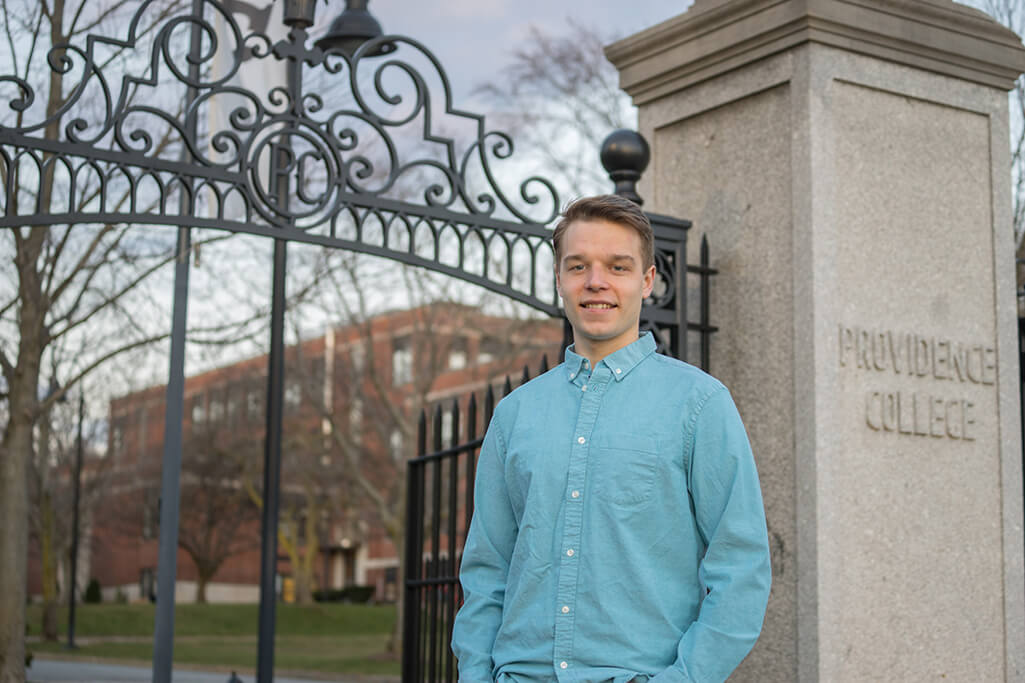
by Daria Purdy ’19
News Staff
As this semester ends, most Providence College seniors will be searching for jobs or preparing for graduate school. But for Michael Gilmor ’17, the coming year will be very different from the experience of his peers. Gilmor is the recipient of the Fulbright Scholarship, and will be spending the next year teaching in Poland.
The Fulbright Scholarship was created at the end of World War II by Senator J. William Fulbright. Fulbright passed legislation for the scholarship in 1946, and the first Fulbright scholars went abroad in 1948.
Dr. John Margenot, the program campus advisor for the Fulbright Scholarship since 2002, described the creation of the scholarship as “a program with student ambassadors that was meant to teach American values abroad and enhance understanding between countries.”
Today, around 8,000 Fulbright grants are given to select applicants each year to travel to their choice of 160 countries to either conduct research or fulfill a teaching position. Gilmor, a biochemistry major and business studies minor, chose to apply for the Poland program for two reasons: math and science are heavily emphasized in the country and his own family is from there.
Gilmor will be an English teaching assistant in Poland, but he also hopes “there will be a possibility for teaching science.”
In addition to his academic pursuits, Gilmor is heavily involved with Habitat for Humanity and hopes to bring this interest with him, especially since the first European chapter of Habitat was created in Poland. He hopes to be able to bring students with him to sites.
Gilmor also desires to get involved in Lean-In STEM Poland, a networking and motivational organization for girls and women interested in a career in the fields of science or technology. In this way, he plans to make an impact both inside and outside the classroom.
Gilmor recognizes that he will encounter several challenges in Europe. He never studied abroad, and subsequently realizes that he will be facing the challenges of living abroad for an extended period of time for the first time. Gilmor says, “I am hoping to learn some Polish this summer in order to help me with the adjustment.”
Yet, Gilmor has already faced great challenges in the rigorous application process for the program. Each applicant is allowed to write a one page personal statement, a statement of grand purpose, and has a 15 minute interview.
“It was very hard to sell myself in such a short period of time,” he stated.
Despite the challenges, Gilmor is excited for what the next year will bring and how it will affect his future career. Gilmor says that he originally wanted to go to medical school, but now has a year to experience new things and figure out what he would like to do after his year abroad.
PC has a good record with the Fulbright program, with one or two students being chosen in the last six years. Yet, the application process is not easy; each application must go through three levels of screening—on the campus level, the national level, and through a committee in the proposed country of travel.
Discussing the application process, Margenot stated, “The application is best suited for highly motivated students, as it is very rigorous and difficult. Work on an application typically begins in mid-March, yet it is not completed until October.”
However, there are support systems on campus for those students interested in applying for a Fulbright Scholarship. Margenot and his colleagues formed an advisory committee that helps guide students in their application process.
Additionally, past Fulbright scholars have come back to campus to speak about their experiences and to give advice to Fulbright hopefuls.
Vincent Whalen ’16, recipient of the Fulbright for the 2015-2016 academic year, came back to campus this year to speak to students about his experiences.
Whalen was awarded a teaching assistant scholarship to University in Madrid, Spain, where he taught English to an international student body.
His talk, says Margenot, was meant to “generate interest in the program,” as well as give an idea of what the Fulbright application process and experience is like for those that are interested. For prospective scholars, Margenot implores that they must “get started early!”
Looking forward to his upcoming adventures, Gilmor stated, “I am very excited to engage with the community in Poland, for a change of scenery, and a chance to immerse myself in the culture.”
Friar Flashback: Beers and Cheers!
by The Cowl Editor on March 22, 2017
News
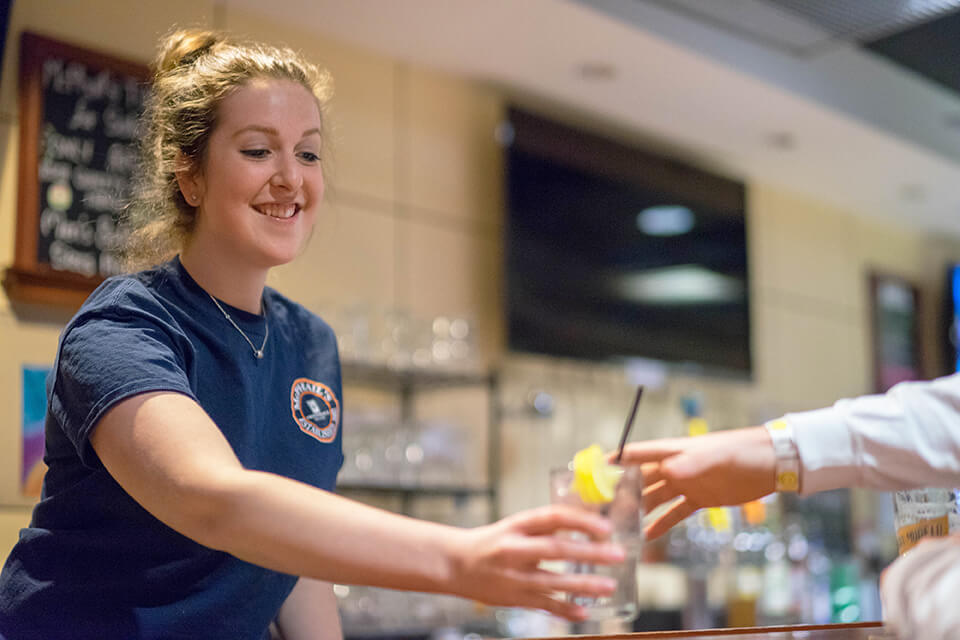
by Daria Purdy ’19
News Staff
McPhail’s gives testimony to the long and colorful history of Providence College through the memorabilia hung upon its walls. Pictures of sports greats, influential administrators and Dominicans, and old spring concerts constantly remind students of the heritage that they live out as a part of the PC community.
Yet, what about the history of McPhail’s itself? The circular journey of McPhail’s, its many re-namings, and its rise in and out of prominence in student life form part of a history that is as colorful as PC’s.
Sgt. David Marshall, a member of PC’s office of safety and security, has seen it all. He joined the PC security staff in 1974, when he was 17 years old, and has been here ever since. He has a memory of a McPhail’s very different from the one that exists today, although it was located within the same building: Slavin Center.
When Sgt. Marshall first started working at PC, the bar on campus was called the Rathskeller. “Rathskeller” is a German word used to refer to a drinking establishment. The bar was located where the fireplace is now located in Slavin, and it consisted of two rooms: one which contained a pool table and another which was the bar area.
Marshall describes the old Rathskeller as “small, too small for concerts or for watching football games,” unlike the current day McPhail’s.
Yet, despite its small size, Marshall describes the bar as having always been crowded, with a line of students waiting to get in. “More people stayed on campus back then,” Marshall says, “as the drinking age was 18, so everyone went to the Rathskeller to have fun with their friends.”
There used to be a game room in Slavin where the bookstore is now, containing games such as pinball and Pacman (popular games in the ’70s). As the bookstore expanded, the games were moved into the Rathskeller. As Marshall describes, in the ’70s Slavin was the center of student life, with the Rathskeller being the social hub.
Then, in the ’80s, the Rathskeller became the Colonel’s Corner, and its location was moved to where the mailroom is currently located. Marshall described this as being a completely different venue. “The bar was now located in a basement,” he says, “It was always a lot darker and somewhat dirtier than when it had been located in Slavin.”
The bar was renamed to honor Col. Andrew DelCorso, who served as a professor of military science and director of the ROTC program in the mid 1960s, and as an associate director of residence for around 20 years.
Marshall says that the move of the bar away from Slavin coincided with a dip in the bar’s popularity. “The theory was that a move of the bar to the center of campus would uphold its popularity, but this was not the case,” says Marshall.
The bar was later moved to lower campus, to the arts service building, to make space for the mailroom. Marshall says that the bar regained its popularity with this further move, as lower campus has always been a hub of student life.
Then, in 2002, the newly re-named McPhail’s was opened in Slavin. The circular journey of McPhail’s was then complete; from its early conception as The Rathskeller, it had moved to the center of campus, then lower campus, and finally back to its original location, re-built and re-named.
Tim Dannenfelser, the manager of McPhail’s since 2012, describes how the new McPhail’s was meant to be an upgrade beyond just a drinking establishment. “The goal was to get freshmen and sophomores to participate in activities at McPhail’s, not just upperclassmen,” Dannenfelser says.
When the drinking age was 18, drinking establishments such as the Rathskeller were an option for all students, but with the drinking age being raised to 21, new activities had to be put in place for the underage freshmen, sophomores, and juniors.
Dannenfelser describes some changes that have taken place at McPhail’s since he started working there in 2012. “I now hire more from the student body,” Dannenfelser says. “This has been a great experience, as I have found PC students to be great workers.”
Dannenfelser also proudly recounts the name of the famous athletic figures whose pictures hang on the walls in McPhail’s. These figures include PC alum Billy Donovan, head coach of NBA team the Oklahoma City Thunder, and Lenny Wilkens, a PC basketball player who went on to play in the NBA from 1960 to 1975.
Looking to the future, Dannenfelser says, “We hope to update our decorations with memorabilia honoring more current athletes, which we think will pertain more to younger students.”
Dannenfelser also said that he believes more renovations in McPhail’s are coming, to make it more and more of a student hub, like it was in the days when it was known as the Rathskeller.
Students Participate in a Spring Break of Service: Habitat for Humanity
by The Cowl Editor on March 17, 2017
News
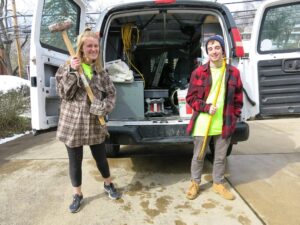
by Daria Purdy ’19
News Staff
On the first day of Spring Break, over 100 Providence College students embarked for destinations across the East Coast to participate in PC’s annual Habitat for Humanity service trip.
This year, Habitat sent students to sites in Pittsburgh, Kittanning, Harrisburg, and York, Pennsylvania; Georgetown, Delaware; Spring Lake, New Jersey; Bridgeport, Connecticut; Mechanicsville, Virginia; and Rockport, Maine. Beyond PC, Habitat for Humanity is an international, nonprofit organization that works to build homes for those living in poverty throughout the world. Their mission is to work towards a world in which everyone has a decent place to live.
As Habitat for Humanity Executive Board member Ashleigh Arenas ’18 describes, “Habitat homes are a ‘hand up’ rather than a ‘hand out,’ since the families have to invest work hours into their home and pay an affordable mortgage.”
To date, Habitat has helped over 2.5 million people all over the world gain access to affordable, quality homes.
Over 100 students participated in the Habitat trip this year. During the trip, Habitat student volunteers built and renovated homes or worked at Habitat ReStore, a nonprofit home improvement store. Taylor Mulhearn ’19 participated on the Habitat trip to Georgetown, Delaware. The trip to Georgetown was a pilot trip, meaning it was the first time that PC had sent students to that site location.
Mulhearn described a typical work day on site: “We had two work crews: an outside crew and a framing crew. The outside crew would saw and prepare pieces of plywood, and then the framing crew would put the pieces in place for the frame of the house. In this way, it worked like an assembly line, in that each person did a smaller job to create a larger whole.”
Mulhearn said that the work was exhausting but that her group had an excellent work ethic and did not complain. Mulhearn described the living situation as a house that had once belonged to AmeriCorps, a civil society program that engages adults in public service work. For fun, the group traveled to the boardwalk at Rehoboth Beach and hung out around the house.
Mulhearn says, “Before the trip, I was very nervous, as I had never done Habitat before and did not know anybody in my group. Yet, after the car ride down to Delaware, all my anxiety had disappeared, and I then knew that this was a great group that I was going to have a lot of fun with.”
Olivia D’Elia ’19 participated on the Habitat for Humanity trip for the second time this Spring Break, traveling to Harrisburg, Pennsylvania, with her Habitat group. D’Elia said her trip this year was different from last year, saying, “We did not do as much demolition, but instead added the finishing touches to the house we were working on.”
D’Elia described how grateful the Habitat affliates at the site were to have the PC students there, as they said that they could not have accomplished by themselves half the work that had been accomplished with the PC students.
D’Elia described how she came back from the site tired each day, but said, “I didn’t want to nap, despite my tiredness, because I was having such a great time talking and hanging out with my Habitat group in the church where we were staying.”
For fun, the group took a trip to nearby Hershey Park. Despite the fact that the rollercoasters were not open, the group shopped for chocolate in the giant Hershey store. One night, the group ate dinner at a local PC student’s house. D’Elia describes her group as becoming very close-knit by the end of the trip.
The Habitat for Humanity Spring Break trips are an annual tradition that hundreds of students have taken part in. As D’Elia and Mulhearn described, the trip is an opportunity for students to make new friends and travel to new places. Beyond this, the students are able to give concrete help to people in impoverished communities. As board member Arenas says, “Habitat is a great opportunity for students to break out of the PC bubble and get involved in something meaningful that literally will aid in changing the lives of families across the country.”
Diversity Lecture
by The Cowl Editor on February 17, 2017
News
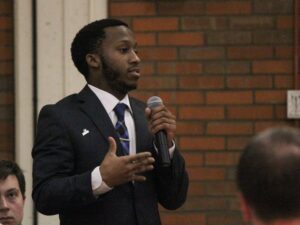
by Daria Purdy ’19
News Staff
Diversity has been a flashpoint issue on the Providence College campus for the last year.
After an alleged incident against an African-American student at a party last year, students protested against the treatment and exclusion of people of color at PC.
Additionally, protest broke out last year following the publication of an article by Dr. Anthony Esolen that commented on what diversity means on a Catholic campus. Many students disagreed with the ideas Esolen put forth concerning diversity.
More recently, a solidarity walk occurred on campus to show support for immigrants affected by President Trump’s recent executive action. The issue of diversity has been contentious on the PC campus, and more recently, has been brought into the forefront as an issue in America as a whole.
The issue of diversity and Catholic identity were explored in an event that was part of the Difficult Dialogues Initiative that took place this Wednesday. The event was titled Six Views on Catholic and Dominican Identity and Contemporary Approaches to Diversity. An invitation to attend the dialogue was extended to all members of the Providence College community. Around 100 students, staff, faculty, and alumni attended the dialogue.
The dialogue was organized by the Office of Institutional Diversity, and was opened by remarks from PC President Fr. Brian Shanley, O.P.,. Shanley expressed the views of a conference of Catholic schools, that he recently attended in Washington, D.C., which explored “diversity as an expression of the grandeur of God.” Shanley said he wished to bring this idea and its implication back to the PC campus.
The talk opened with seven different speakers who addressed the question, What is the greatest challenge connecting Catholic and Dominican identity with contemporary understanding of diversity?
The first speaker was Dr. Patrick Breen, an associate professor of history. Breen told the story of a 19th century slave in North Carolina who was allowed to choose her own master. The slave chose a man she knew from church, believing that his faith would make him a good master.
Instead, Breen recounted how this slave master did not provide for the basic needs of his slaves. Breen pointed out how the master’s faith was insufficient, and how it demonstrated the “complex and sometimes paradoxical nature of humans.” Breen believes that it is important to keep this aspect of human nature in mind when discussing diversity.
The next speaker was Michael Bartels ’18, president of the history club. Bartels detailed the current political climate of America and how it related to ideas about diversity. Bartels believes that the current trend in politics to attack the supporters of a political figure has lead to a need to defend one’s identity instead of a search for truth. Many people believe themselves to be “inevitably right,” and do not open themselves up to understand the worldview of others.
The next speaker, Dr. Jennifer Illuzzi, associate professor of history, emphasized the need to create a new story for PC, one that takes into account all its diversity and history. Illuzzi pointed out that one needs to confront the darker aspects of the history of Christianity, along with recognizing the liberating message of the Gospel.
The fourth speaker was Nicholas Sailor ’17, who contrasted the difference between the ideals of Catholic thought and the practical challenges of implementing it. He also expressed his worry about the void of support he has found in his effort to confront and explore issues of diversity.
Dr. Matthew Cuddeback, assistant professor of philosophy, then tackled the issue of the place of LGBTQ people at a Catholic institution. He pointed out the fact that the Church has clear teachings against homosexual relations, and stated that PC needs to confront its relationship to these ideas.
Tiffany Gaffney, assistant dean of students, also addressed the issue of LGBTQ students. Gaffney insisted on love as a starting point for such dialogue; she said it important to make LGBTQ students feel loved, first and foremost, and then work through challenges from that starting point.
Finally, Rev. Nicanor Austriaco, O.P., professor of biology and theology, described how the experience of being discriminated against changed the way that he thought. He described discrimination as a “habituation of the soul,” and said that experiences of marginalization can change one’s worldview.
After the speakers had concluded, participants were broken into small groups to discuss what had been said.
Some of the questions that the small groups encountered included: Does PC have a lack of consensus about its Catholic identity? Should PC aspire to be all things to all people? Does everyone on campus have a clear understanding of what the Catholic and Dominican mission is?
All these questions will need to be addressed moving forward, as PC struggles to reconcile its Catholic identity to a growing desire for and presence of diversity.
Off-Campus Beat: North Korea Launches Missile
by The Cowl Editor on February 17, 2017
News

by Daria Purdy ’19
News Staff
Tension increased this past week between North Korea and the United States and its allies as North Korea successfully tested a new nuclear missile.
The new missile is called the Pukguksong-2, and it was launched Sunday about 310 miles into the Sea of Japan. The distance is short of the estimated rage of the missile, which is around 1,864 to 3,417 miles.
The development of the Pukguksong-2 missile has caused the United States and its allies anxiety because the new technology of the missile makes it much harder to have a preemptive warning of a missile launch.
The new missile is a solid-fuel rocket, meaning it does not require the long process of fuel-loading in order to function properly. It can be stored on mobile launchers, rolled out, and prepared for launch within minutes, if the North Korean reports are to be believed.
This would make it much harder to receive warning of a missile launch through satellite technology. North Korea’s leader, Kim Jong-Un, claimed, “Now our rocket industry has radically turned into a high-thrust solid-fuel-powered engine from liquid-fuel rocket engine and rapidly developed into a development and creation-oriented industry, not just copying samples.”
Defense officials in the area say that North Korean missiles do not yet have the ability that Kim Jong-Un claims, but that the launch of the Pukguksong-2 represents significant advances in the stealth and range of these missiles.
The test took place while a state dinner was being held between President Donald Trump and Prime Minister of Japan Shinzo Abe. Aides interrupted the dinner at the Mar-a-Lago resort in Florida to bring both leaders reports of the missile test.
Abe called the missile test “absolutely intolerable.” Japan’s Chief Cabinet Secretary Yoshihide Suga, meanwhile, echoed Abe’s words, stating that the test was a “clear provocation to Japan and the region.”
A United Nations Security Council meeting was requested by the United States, Japan, and South Korea in response to the missile launch.
The United States Security Council responded that it plans to hold consultations on an “urgent basis.” Tokyo has lodged protests against North Korea through its embassy in Beijing.
Despite being allies of North Korea, both China and Russia also spoke out against the missile launch. China denies the need to take any greater responsibility in curbing the actions of North Korea, but the Foreign Ministry said that China is opposed to launch activities that are in violation of UN resolutions.
China is North Korea’s most important ally, and helps to keep it afloat economically amidst crippling sanctions. Yet, the recent rhetoric concerning the launch of the Pukguksong-2 reflects a trend in which China has begun to take a tougher stand on the North Korean nuclear program.
The Foreign Ministry of Russia, another important North Korean ally, said that the missile launch was in “defiant disregard” of UN resolutions.
This missile test is the first since Trump’s inauguration, and it can be seen as the first foreign challenge to the Trump administration.
So far, the response of President Trump has been to issue a joint statement with Abe, in which he said that he had “100 percent support” for Japan, and called them “a great ally.”
Club Spotlight: IAB
by The Cowl Editor on February 10, 2017
News
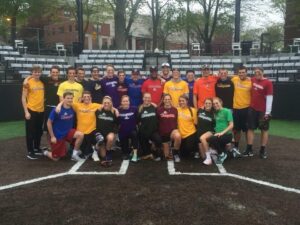
by Daria Purdy ’19
News Staff
The Intramural Athletic Board (IAB) is an organization that allows students to get involved with running the intramural sports program. There are 18 current members of the board, and four who hold executive positions: Kaitlin Koste ’17, president; Joe DeChirico ’17, vice president of operations; Robert Taranto ’17, vice pesident of administration; and Kaitlyn Dempsey ’17, vice president of marketing.
DeChirico says the task of the IAB “is to make sure the intramural program runs as smoothly as possible and to make sure that students have a great overall experience.” The executive board meets with the Assistant Director of Intramurals, Nick Sweatt, to run day-to-day operations and to discuss big-picture goals.
The board members supervise the sporting events, and many of them are also officials. The IAB also completes administrative tasks, such as putting together equipment, creating scoresheets, and inputting statistics.
Along with supervising the 23 sports offered, the board runs some late night programming events, such as the basketball tournament that is held after Late Night Madness. The entire board meets together once a week.
DeChirico says “IAB is one of the smallest clubs on campus, so we always consider ourselves family.” The members of the board, along with running intramural sports, also participate in many of these sports.
DeChirico says, that since becoming a member of the board, he has participated in almost all the 23 intramural sports offered. The members of the IAB also get paid for their work. The application for new members will be sent out shortly before spring break. Information about the IAB can be found on their Instagram, via @pc_iab.
PC Community Protests Executive Order
by The Cowl Editor on February 3, 2017
News
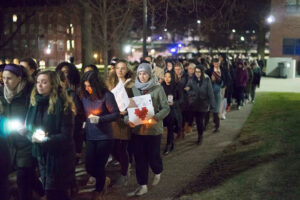
by Daria Purdy ’19
News Staff
Immigration practices in the United States underwent a significant change this previous week. President Donald Trump signed an executive order on Friday, January 27, that specifically affected certain groups of immigrants.
The executive order indefinitely banned Syrian refugees from entering the United States, suspended all refugee admissions for 120 days and blocked citizens of seven countries from entering the United States: Iran, Iraq, Libya, Somalia, Sudan, Syria, and Yemen.
The order does not pertain to naturalized citizens from the seven named countries, but it does apply to students, visitors, and green-card-holding legal permanent residents.
The order ran into immediate opposition throughout the country. Acting Attorney General Sally Yates ordered the Justice Department not to defend the executive order in court, and was fired for her actions.
Federal judges in New York, Massachusetts, Virginia, and Washington all made rulings that blocked part of Trump’s order.
A Brooklyn judge ruled that travelers being held at airports across the country should not be deported back to their own countries. At least 100 diplomats from the State Department signed a dissent memo that expressed opposition.
On a grassroots level, protests erupted in airport terminals throughout the country, including airports in New York, Atlanta, Washington, and Dallas. On Jan. 28, lawyers flocked to O’Hare International Airport to volunteer their services to those being detained in the terminal. Crowds formed and protests were staged in Boston’s Copley Square, Manhattan’s Battery Park, and outside the White House.
The Providence College community was affected by the executive order and its consequences. Father Brian Shanley, O.P., told students, “This is a time of great confusion which calls us to respond in the light of our Catholic values.” Father Shanley also emphasizes that “as a Catholic and Dominican institution, we are committed to authentic hospitality. We welcome and embrace people of every nation and of every faith.”
The feelings of PC students towards the recent events were expressed by the Solidarity Walk, organized by the Board of Multicultural Student Affairs, which took place around campus on Jan. 29. Olivia Lo ’18, BMSA Executive Secretary, said the walk, “allowed us to show support to marginalized groups such as the Muslim population, immigrants, women, people of color, and those of the LBGTQ+ community.” The walk began in Moore Hall, and as it moved around campus its numbers swelled to around 200 students. The walk traveled through both Alumni Food Court and Raymond Hall, where many students were eating their dinners. Silence spread as the walkers appeared, interspersed with occasional applause or shouted comments. The participants linked arms, and many held signs with slogans such as “the future is diverse,” “we are all humans,” “stand for one stand for all,” and “seeking asylum is a human right.”
BMSA President Pedro Alemán ’17 said the organization provided “an opportunity to do a Solidarity Walk around campus to show support for our fellow brothers and sisters, family and friends. We walked with candles and signs to show our fellow PC community that there are members in this very campus who have fallen victim of these policies.” Lo elaborates, “The Friar Family should stand up to policies that suppress human rights and support those who may have been hurt or could be hurt. BMSA refuses to be bystanders of these new orders, and hope the Friar Family does as well.” Lo also offered her sincere thanks for those students who participated in the walk. For anyone who would like to learn about helping marginalized groups, Lo mentions some upcoming conferences. “UndocYOUniversity” will take place on March 21 and will be free to PC students. The “Drive RI” conference will take place on March 24-25 at the University of Rhode Island.
Club Spotlight: One Love
by The Cowl Editor on January 27, 2017
News
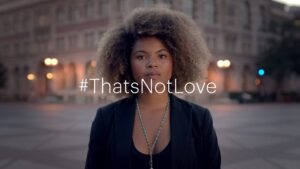
by Daria Purdy ’19
News Staff
It is known that one in three women and one in four men experience some type of relationship violence throughout their lives. At Providence College, the One Love club has been created to address this issue of relationship violence.
One Love is a greater non-profit organization that was founded in 2010 after University of Virginia senior Yeardley Love was killed by her abusive boyfriend. The goal of the foundation, founded by Love’s mother Sharon Love, is to raise awareness about the consequences of relationship violence.
The One Love chapter at PC is lead by President Morgan Itz ’18, with Angela Martello ’18 as vice president, Katie Blue ’18 and Hannah Deignan ’18 as co-secretaries, and Meg Falcone ’18 as treasurer.
Itz says, “Our foundation as a club is to raise awareness and educate college students about the warning signs of relationship abuse and violence.”
Itz says that meetings of the club are generally based on discussion and event-planning. One meeting involved a One Love member as a guest speaker, who talked about her job and about the foundation as a whole. The club hopes to hold events to help educate the PC community about relationship violence, its warning signs, and what to do if you or a friend is affected by it.
Itz comments on the uniqueness of One Love, saying there is no other club like it on the PC campus. She says, “Many people do not like to talk about relationship violence or recognize that it is a problem here on campus, and our goal as the One Love club is to educate people on the severity of this topic.”
Itz believes it is essential that issues of relationship violence can be discussed on college campuses.
Active Minds Attends National Conference
by The Cowl Editor on January 19, 2017
News
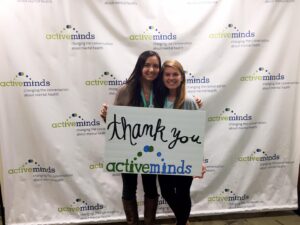
by Daria Purdy ’19
News Staff
Active Minds, Inc. is a national non-profit organization, and it has a chapter at Providence College. Active Minds was founded in 2000 by University of Pennsylvania student Alison Malmon, following the suicide of her older brother Brian.
The non-profit strives to end the stigma surrounding mental illness by opening up conversations about mental health and encouraging students to get the help they need. Active Minds has over 400 chapters at colleges and universities throughout the country.
Students Colleen Andersen ’17 and Cassandra Caggiano ’18 are co-presidents of the Active Minds chapter at PC, and Connor Murphy ‘17, Abby Wolf ’18, and Anissa Latifi ’18 serve on the Executive Board.
Andersen describes the mission of the chapter as “ending the stigma surrounding mental illness on our campus through building awareness and educating all students.” The organization is not a support group, but rather a catalyst for starting conversation about mental illness on campus, and giving students the confidence to seek the mental health support they need. Furthermore, Andersen and Caggiano work to educate the PC community about the larger organization of Active Minds and its mission.
The Active Minds chapter meets every other Thursday at 7 p.m. in Feinstein 115. According to Andersen, during meetings the Active Minds members “brainstorm ideas and plan events.” Fun activities, such as making stress balls, are often incorporated. The meetings end with the members sharing a high and a low note of the week.
In November, the leaders of the Active Minds chapter at PC were able to attend the National Mental Health on Campus Conference in Sacramento, California.
Andersen says that at the conference they “had a chance to meet and collaborate with other student leaders a professional advocates from around the country.” The Active Minds leaders were able to attend workshops, hear from keynote speakers, and share their struggles and successes with other student leaders.
Andersen says that they also learned more about how to give marginalized groups more access to mental health support. Andersen describes that at PC, the three groups of students who are least likely to use the Personal Counseling Center are athletes, members of the LGBTQ community, and first generation college students.
Since the theme of the conference was “inclusion,” the Active Minds leaders learned a lot about how to give marginalized groups mental health support.
Using what they learned from the conference, Andersen says that she hopes her and her fellow members can make “students feel as though they can speak up for themselves and their friends when it comes to issues related to mental illness.”
